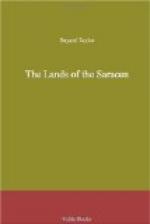Kara-bounar is built on the slope of a mound, at the foot of which stands a spacious mosque, visible far over the plain. It has a dome, and two tall, pencil-like towers, similar to those of the Citadel-mosque of Cairo. Near it are the remains of a magnificent khan-fortress, said to have been built by the eunuch of one of the former Sultans. As there was no water in the wells outside of the town, we entered the khan and pitched the tent in its grass-grown court. Six square pillars of hewn stone made an aisle to our door, and the lofty, roofless walls of the court, 100 by 150 feet, inclosed us. Another court, of similar size, communicated with it by a broad portal, and the remains of baths and bazaars lay beyond. A handsome stone fountain, with two streams of running water, stood in front of the khan. We were royally lodged, but almost starved in our splendor, as only two or three Turcomans remained out of two thousand (who had gone off with their herds to the mountains), and they were unable to furnish us with provisions. But for our frankolins and starlings we should have gone fasting.
The mosque was a beautiful structure of white limestone, and the galleries of its minarets were adorned with rich arabesque ornaments. While the muezzin was crying his sunset-call to prayer, I entered the portico and looked into the interior, which was so bare as to appear incomplete. As we sat in our palace-court, after dinner, the moon arose, lighting up the niches in the walls, the clusters of windows in the immense eastern gable, and the rows of massive columns. The large dimensions of the building gave it a truly grand effect, and but for the whine of a distant jackal I could have believed that we were sitting in the aisles of a roofless Gothic cathedral, in the heart of Europe. Francois was somewhat fearful of thieves, but the peace and repose of the place we’ve so perfect that I would not allow any such apprehensions to disturb me. In two minutes after I touched my bed I was insensible, and I did not move a limb until sunrise.
Beyond Kara-bounar, there is a low, barren ridge, climbing which, we overlooked an immense plain, uncultivated, apparently unfertile, and without a sign of life as far as the eye could reach. Kara Dagh, in the south, lifted nearer us its cluster of dark summits; to the north, the long ridge of Uesedjik Dagh (the Pigmy Mountain) stretched like a cape into the plain; Hassan Dagh; wrapped in a soft white cloud, receded behind us, and the snows of Taurus seemed almost as distant as when we first beheld them from the Syrian Gates. We rode for four hours over the dead level, the only objects that met our eyes being an occasional herd of camels in the distance. About noon, we reached a well, similar to that of the previous day, but of recent construction. A long, steep gallery led down to the water, which was very cold, but had a villainous taste of lime, salt, and sulphur.




